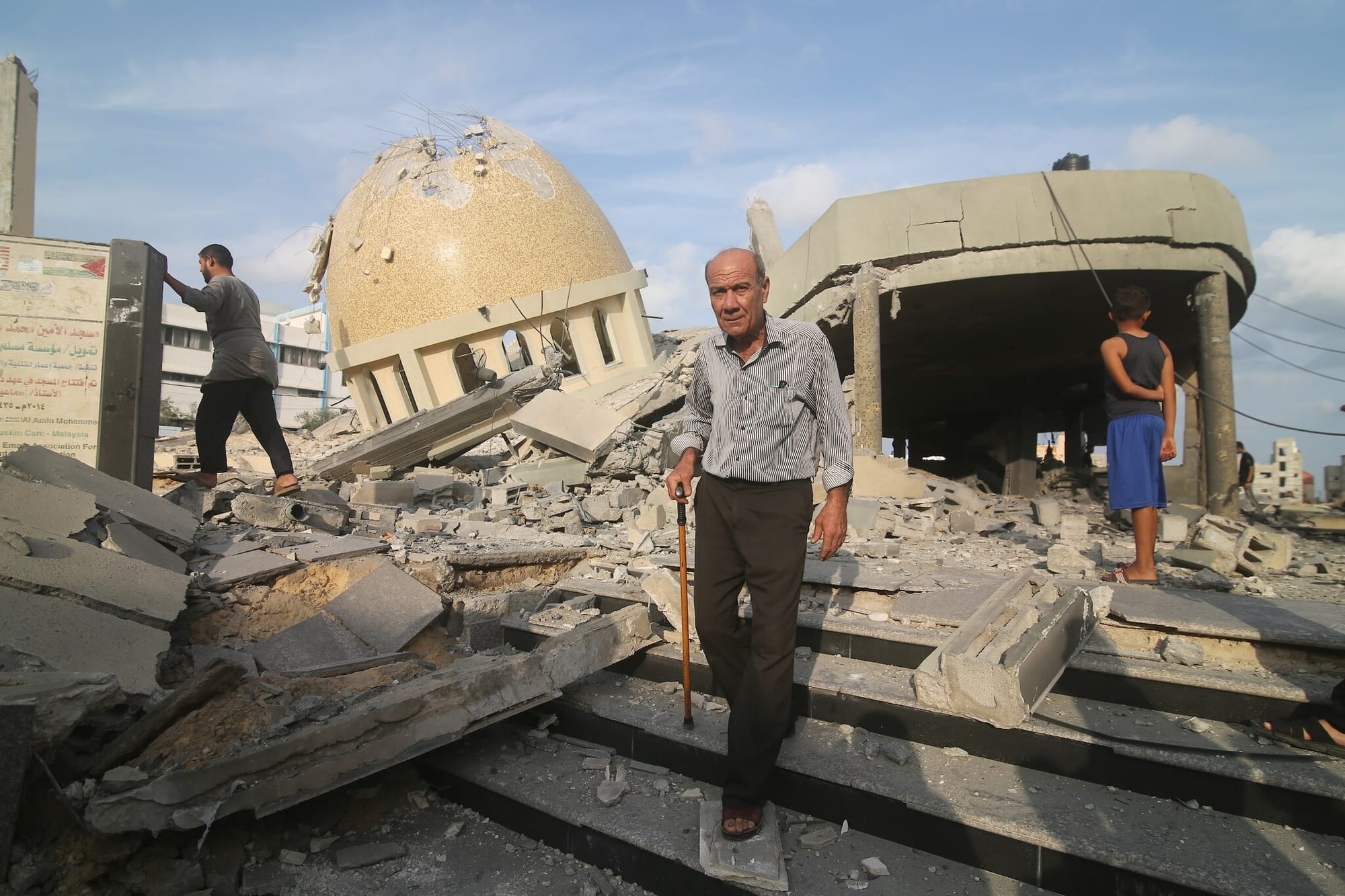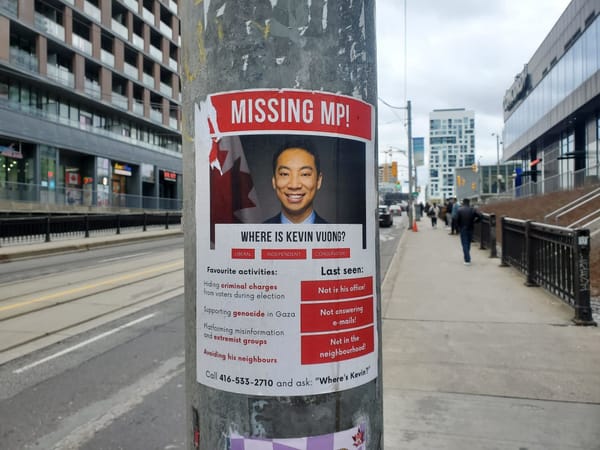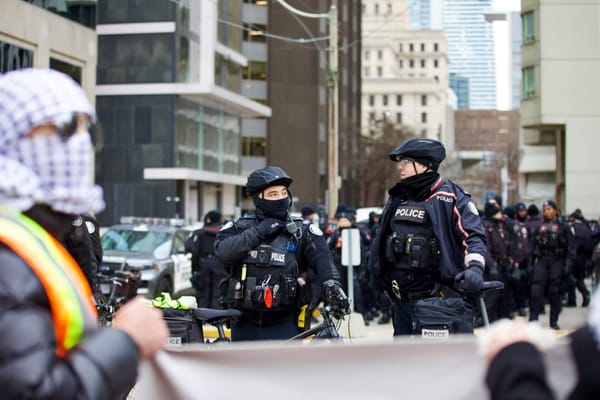Since October 7, Israel’s genocide in Gaza — or the “Israel-Hamas war,” as many mainstream outlets like to call it — has dominated news coverage in Canada, including at The Maple.
Over that time, there has been some public introspection among journalists about how they’ve covered these events, the difficulties of doing so, what impact it has had on them, etc. The level of usefulness of these discussions has varied.
On the lower end, a January 8 episode of Canadaland saw the publication’s founder, editor-in-chief, a veteran CBC journalist and the president of the Canadian Association of Journalists describe journalists in Canada as having “the weight of the world on their shoulders,” being “frightened” and “terrified,” and facing a public with “no kindness” for their mistakes. They spent just five seconds of the conversation talking about Israel killing Palestinian journalists, leaving more than enough time for some true pieces of insight like: “What makes this war different than, say, Ukraine, I think, is that we don’t have consensus. [...] There was general consensus that Putin’s the bad guy and Russia is the bad actor.”

A more useful occasion was a January 30 vigil for journalists killed since October 7. This event focused entirely on the journalists killed, described how the Israeli state is preventing them from doing their jobs, read out all of their names, and told some of their stories. More than 100 journalists showed up to the event in downtown Toronto, which is notable given that simple actions in the past such as calling on Israel not to kill journalists has led to professional repercussions.
Still, there is much more to say. Looking abroad, one way to improve the conversation would be to think about how journalists here can act in solidarity with those being killed in Gaza. What can we do for those who share our profession?
Looking inward and forward though, there’s a question that I haven’t seen anyone in media in this country reckon with: What does Israel potentially being guilty of genocide mean for us? Not just for Israel or Canada, but the news industry in Canada in particular.
There are a few things to establish here.
First, on January 26, the International Court of Justice (ICJ) issued an order on South Africa’s request for provisional measures in its case against Israel accusing the state of genocide in Gaza. The order stated: “In the Court’s view, at least some of the acts and omissions alleged by South Africa to have been committed by Israel in Gaza appear to be capable of falling within the provisions of the [Genocide] Convention.” The ICJ also ordered Israel (by votes of either 15 to 2 or 16 to 1) to immediately take a variety of strong measures to meet its obligations under the Genocide Convention, which it has since ignored. Israel will now be put on trial to determine if it has committed genocide.
Second, these measures do not just apply to Israel. All signatories to the Genocide Convention (including Canada) have a duty to not commit genocide and to prevent genocide from occurring. This means that countries other than Israel can also be found guilty of genocide for their conduct since October 7.
Canada is perhaps one of the worst offenders. In the first two months after October 7, Canada approved about $28.5 million in arms exports to Israel, potentially for lethal weapons that can be, and perhaps are being, used by Israeli soldiers to kill Palestinians, from those who have yet to celebrate their first birthday to those who were around during the first Nakba. Canada is also among a group of nations that cut funding to UNRWA, an organization that has done essential work to keep Palestinians alive, in the hours after the ICJ issued its ruling. In multiple statements, Canada said it does not “accept the premise of the case brought by South Africa,” and failed to call on Israel to abide by the measures ordered by the court (something it has done quite forcefully in response to rulings the court has made on other countries, such as Syria). It took until February 14 for Canada to do so. Some reports have also come out claiming that Canada itself will be brought before the ICJ due to these actions.
In sum, Canada is among a small group of the worst nations in the world on this matter, flagrantly violating international law. The friendly press coverage of Canada and its allies here does not change this reality.
Third, while rare, journalists can be found guilty of genocide, and have been in the past. In 2003, the International Criminal Tribunal for Rwanda found two journalists in the country “guilty of genocide, incitement to genocide, conspiracy and crimes against humanity.” Going further back, an editor of a Nazi newspaper was found guilty of publishing genocidal propaganda and executed.
In a 2018 academic paper about the connection between journalists and genocides, scholar John Hickman wrote that journalists’ “work as propagandists has been essential to modern governments perpetrating war crimes.” Hickman argues that governments need “journalists to persuade mass publics to assist, endorse or acquiesce in them,” and that without them, “such criminality would be more difficult and probably less horrific in scale.”
Fourth, journalists were mentioned in South Africa’s application to initiate genocide proceedings against Israel. The application stated: “genocidal rhetoric is also commonplace in Israeli civil society, with genocidal messages being routinely broadcast — without censure or sanction — in Israeli media. The media reports call for Gaza to be ‘erase[d],’ turned into a ‘slaughterhouse’, that ‘Hamas should not be eliminated’ but rather ‘Gaza should be razed’, on the repeated claim that ‘[t]here are no innocents… There is no population. There are 2.5 million terrorists’.” The application added, “Those statements by prominent members of Israeli society — including former parliamentarians and news anchors — constitute clear direct and public incitement to genocide, which has gone unchecked and unpunished by the Israeli authorities.” The conduct of journalists was also mentioned in South Africa’s oral proceedings before the court.
As such, journalists can be and may be charged with genocide for work they’ve published since October 7, and as a news industry in a country directly aiding and enabling Israel’s genocide, this should be on the mind of journalists in Canada as well. For example, consistent pro-Israel messaging in Canadian media could play a role in building support for, and minimizing opposition to, Canada’s sale of weapons to Israel or cutting of funds to organizations meant to help its victims. The coverage could also have played a role in convincing Canadians to go overseas to join the Israeli army in its slaughter, which at least some have done — an action that has won them several puff pieces in media outlets.

But what exactly might make a journalist guilty of genocide? According to the Genocide Convention, the following acts are punishable: genocide; conspiracy to commit genocide; direct and public incitement to commit genocide; attempt to commit genocide; complicity in genocide. Hickman writes that the most relevant one of these acts for journalists is incitement.
So, what counts as incitement? There is direct incitement, which comprises the sort of statements in Israeli media quoted by South Africa in its application. However, direct incitement is not the only form of incitement, with nine others being commonly listed. In the 2017 book Atrocity Speech Law: Foundation, Fragmentation, Fruition, Gregory S. Gordon writes that these other forms are: “2) predictions of destruction; 3) verminization, pathologization, demonization, and other forms of dehumanization; 4) accusation in a mirror; 5) euphemisms and metaphors; 6) justification during contemporaneous violence; 7) condoning and congratulating past violence; 8) asking questions about violence; 9) conditional calls for incitement; and 10) victim-sympathizer conflation.” For the purpose of this article, I will focus on two of them: accusation in a mirror and justification.
Accusation in a mirror (AiM), Gordon writes, “is a genocidal speech technique that entails accusing the victim of a plan to commit the identical offenses that the actual perpetrator seeks to commit or has already committed.” The term AiM was coined by the perpetrators of the Rwandan genocide in what was effectively a manual on how to incite genocide that was discovered. The propagandist behind the note wrote that genocidaires should “impute to enemies exactly what they and their own party are planning to do.” They added that this method will “persuade listeners and ‘honest people’ that they are being attacked and are justified in taking whatever measures are necessary ‘for legitimate [self-]defense.’”
In a 2008 paper on incitement to genocide, Susan Benesch wrote, “The propagandist understood that accusation in a mirror achieves an important psychological prerequisite for genocide: it provides a collective justification for mass atrocities, just as self-defense provides an ironclad excuse for the crime of homicide.” Benesch added, “Dehumanization [...] makes genocide seem acceptable. ‘Accusation in a mirror’ goes further by making it seem necessary. The fact that this succeeded—that populations came to believe that unarmed or grossly outnumbered Jews, Muslims, or Tutsi might actually annihilate the Germans, the Serbs, or the Hutu—demonstrates the power of incitement.”
Justification, Benesch writes, means “to refer to atrocities that are already underway, correctly identifying the victims but describing the atrocities in ways that make them sound morally justified.” Benesch adds, “‘In many of the most hideous international crimes, many of the individuals who are directly responsible operate within a cultural universe that inverts our morality and elevates their actions to the highest form of group, tribe, or national defense,’ as [Yale Law professor emeritus] W. Michael Reisman has observed. Nazi leaders, for example, continually emphasized the ‘humaneness’ of the massacres, torture, death marches, slavery, and other atrocities they ordered.”
A disclaimer: I’m not a genocide scholar or a lawyer, am not qualified to charge someone of genocide and am not suggesting that the following authors are guilty of incitement to genocide or would be found guilty of it before a court. I bring up the following examples because criminal responsibility does not need to be established for something to spur journalists and people of conscience to action.
I have not found the sort of direct incitement rampant in Israeli media in Canadian publications at this point. However, there are articles that sound to me, based on the descriptions I’ve read from scholars, to be examples of AiM and justification. These go beyond just supporting Israel’s actions. First, here are a few that sound like AiM to me.
On January 9, The Globe and Mail published an article by Rosalie Abella titled, “The genocide case against Israel is an abuse of the postwar legal order.” In it, Abella writes, “It is a legal absurdity to suggest that a country that is defending itself from genocide is thereby guilty of genocide.” Abella clearly states that the Palestinians are guilty of genocide, not the Israelis.

On January 29, the National Post published an article by Vivian Bercovici titled, “Israel is the true victim of genocidal intent.” Bercovici writes, “Hamas leaders and supporters worldwide have stated their unequivocal aspiration to repeat the genocide of Oct. 7, repeatedly.” She says that “Israeli politicians have made imprudent comments” but that they “pale in comparison to the blood-curdling sadism of Oct. 7, which has been celebrated by Hamas and so many of its supporters in the four months since and call for it to continue until Israel and its Jewish population are destroyed. Completely. Totally. Utterly. That is genocidal intent.” Again, Hamas is charged of genocide here, while Israel is not.
On February 18, the National Post published an article by Stephen Harper titled, “Israel’s war is just, Hamas must surrender or be eliminated.” Harper writes that Hamas’ actions on October 7 represented “the urge to commit genocide at its most evil,” and added that the operation “may not have been a Holocaust in scale, but it was in kind.” Israel’s actions, meanwhile, are not only defended, but described as “essential.”
These articles stuck out to me not just because they seem to be examples of AiM, but also because of who wrote them. Abella was a Supreme Court justice in Canada from 2004 to 2021. Bercovici is one of Canada’s former ambassadors to Israel. Harper was Canada’s prime minister for nearly a decade. These are not fringe people.
There are also many slightly more indirect examples of AiM being employed. Several articles (in a range of publications, including the Toronto Star, The Globe and Mail, The Hamilton Spectator, the National Post, and the Montreal Gazette) have accused the Palestinian slogan of, “From the river to the sea, Palestine will be free” of being a call to the genocide and ethnic cleansing of Jewish people in the area. This is occurring while Israel continues its decades-long history of doing that, but to the Palestinians. Israel’s Prime Minister, Benjamin Netanyahu, even used that exact slogan to describe what Israel wants and will do, which is about as clear of an example of AiM as you can get.
Next, here are a few examples that sound like justification to me.
On Nov. 10, 2023, the National Post published an article by Avi Benlolo titled, “The International Criminal Court must prosecute Hamas’s war crimes.” Benlolo writes, “Hamas shows little care or concern for the lives of civilians on either side, which constitutes war crimes. In stark contrast, Israel diligently strives to protect civilian lives. Since Oct. 7, the Israel Defence Forces has made over 20,000 phone calls, dropped 1.5-million leaflets and sent over four-million SMS messages warning civilians about upcoming military actions and urging them to temporarily move to safety zones.” An Israeli campaign the ICJ has determined may plausibly amount to genocide is described as humane, and of being an example of the state’s higher moral status.
On Dec. 8, 2023, the National Post published an editorial titled, “No truth behind claim that Israel is committing genocide.” The editorial board writes, “There’s no question that the Hamas fighters who streamed into Israel on Oct. 7 intended to kill or capture as many Israeli civilians as they could. The Israel Defence Forces (IDF), in contrast, have taken active steps to minimize civilian casualties. At the start of the war, Israel warned civilians to evacuate northern Gaza. It dropped leaflets, placed phone calls and sent text messages ahead of air strikes and ground offensives. It opened humanitarian corridors so Gazans could move south in safety, and initiated daily four-hour humanitarian pauses so people could gather supplies or travel to safer areas.” This is a nearly identical example of the rhetoric used by Benlolo.
On Dec. 10, 2023, the National Post reprinted an article from the Jerusalem Post by Jenny Hazan titled, “Are Canadians going to stand up to Jew hate?” Hazan writes, “We will fight it with the utmost humanity possible, as we have fought all the wars we have had to fight. That’s why Israel sprinkled warning flyers begging civilians to evacuate two weeks before retaliating. And why Israeli hospitals will treat a bomber at the same ER as his victims. [...] The list of kindnesses goes on.” Again, Israel’s conduct is portrayed as not only humane, but the most humane in the world.
Some journalists will respond to this piece and argue that while they don’t agree with the articles I’ve cited, there’s no indication that they’d violate any sort of laws. That may be the case, and I’m certainly not qualified to determine if it is, but again, something doesn’t have to be found to be illegal to consider it unacceptable.
Others may also be disturbed by the articles and see them as within the scope of journalism considered as genocide incitement, but point out that, well, they didn’t write them, so it’s not their problem. The vast majority of journalists obviously did not write the articles I mention. But did any of them edit the articles? Copy edit them? Lay out the pages for the physical newspapers in which the articles were published? Enter the article into a CMS and publish it online? Send out social media posts containing links to the article? Do other work to allow these publications to put out the articles? Do nothing about it when they were published?
A few people wrote these articles, but how many journalists work at Postmedia? Or Torstar? Where does the responsibility end? How far away from direct work on the articles do you need to be to feel comfortable saying you have nothing to do with them, and to do nothing about them?
These are the sorts of conversations journalists should be having, and the sort of questions they should be asking. Not just among themselves, but publicly, before the Canadians they serve, a plurality of which (41 per cent) agree Israel is engaged in genocide, according to a February Angus Reid poll.
These questions and issues don’t just matter in the current moment (though this is when they matter the most), but also for the legacy of Canadian journalism — for how the public here and abroad, scholars, legal figures, government officials, and future journalists look back at what the Canadian media did during what there is a chance may be ruled a genocide.
History is not going to look fondly on Canadian media. The mass slaughter should have prompted change far before it was ruled that it may plausibly be genocide. But with the ruling, there’s even less of an excuse. Unfortunately, it seems too many journalists are content to wait around for what may be a years-long ICJ trial to conclude. And when that happens, and Israel is perhaps found guilty of genocide, they will have acted like they were always against it and did what they could.









Member discussion